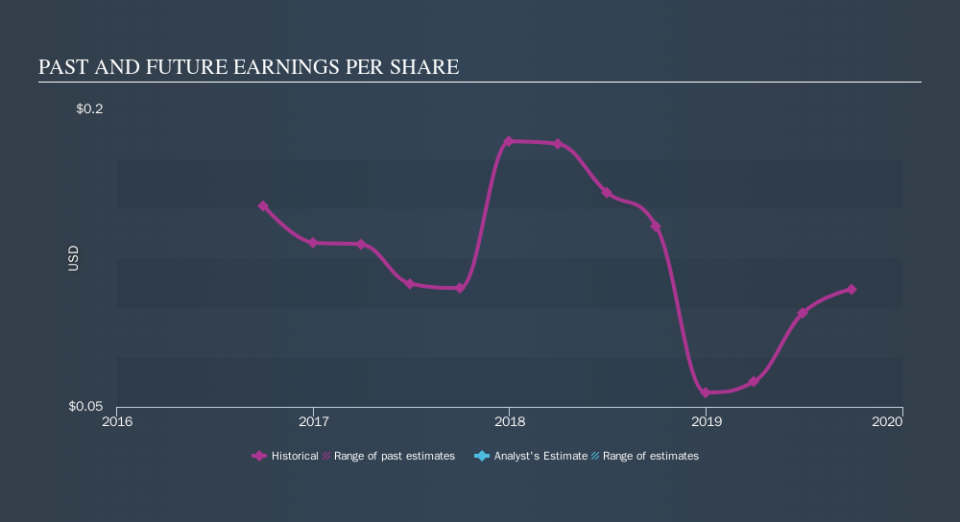The Kentucky First Federal Bancorp (NASDAQ:KFFB) Share Price Is Down 11% So Some Shareholders Are Getting Worried

As an investor its worth striving to ensure your overall portfolio beats the market average. But the risk of stock picking is that you will likely buy under-performing companies. Unfortunately, that's been the case for longer term Kentucky First Federal Bancorp (NASDAQ:KFFB) shareholders, since the share price is down 11% in the last three years, falling well short of the market return of around 48%. The good news is that the stock is up 1.2% in the last week.
See our latest analysis for Kentucky First Federal Bancorp
In his essay The Superinvestors of Graham-and-Doddsville Warren Buffett described how share prices do not always rationally reflect the value of a business. One imperfect but simple way to consider how the market perception of a company has shifted is to compare the change in the earnings per share (EPS) with the share price movement.
Kentucky First Federal Bancorp saw its EPS decline at a compound rate of 10% per year, over the last three years. In comparison the 3.7% compound annual share price decline isn't as bad as the EPS drop-off. This suggests that the market retains some optimism around long term earnings stability, despite past EPS declines. With a P/E ratio of 69.83, it's fair to say the market sees a brighter future for the business.
You can see how EPS has changed over time in the image below (click on the chart to see the exact values).
We're pleased to report that the CEO is remunerated more modestly than most CEOs at similarly capitalized companies. It's always worth keeping an eye on CEO pay, but a more important question is whether the company will grow earnings throughout the years. This free interactive report on Kentucky First Federal Bancorp's earnings, revenue and cash flow is a great place to start, if you want to investigate the stock further.
What About Dividends?
It is important to consider the total shareholder return, as well as the share price return, for any given stock. The TSR is a return calculation that accounts for the value of cash dividends (assuming that any dividend received was reinvested) and the calculated value of any discounted capital raisings and spin-offs. So for companies that pay a generous dividend, the TSR is often a lot higher than the share price return. As it happens, Kentucky First Federal Bancorp's TSR for the last 3 years was 2.8%, which exceeds the share price return mentioned earlier. The dividends paid by the company have thusly boosted the total shareholder return.
A Different Perspective
Kentucky First Federal Bancorp shareholders are up 4.5% for the year (even including dividends) . But that was short of the market average. On the bright side, that's still a gain, and it's actually better than the average return of 3.5% over half a decade This could indicate that the company is winning over new investors, as it pursues its strategy. Most investors take the time to check the data on insider transactions. You can click here to see if insiders have been buying or selling.
But note: Kentucky First Federal Bancorp may not be the best stock to buy. So take a peek at this free list of interesting companies with past earnings growth (and further growth forecast).
Please note, the market returns quoted in this article reflect the market weighted average returns of stocks that currently trade on US exchanges.
We aim to bring you long-term focused research analysis driven by fundamental data. Note that our analysis may not factor in the latest price-sensitive company announcements or qualitative material.
If you spot an error that warrants correction, please contact the editor at editorial-team@simplywallst.com. This article by Simply Wall St is general in nature. It does not constitute a recommendation to buy or sell any stock, and does not take account of your objectives, or your financial situation. Simply Wall St has no position in the stocks mentioned. Thank you for reading.

